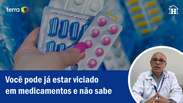Teachers explain why we become addicted to addictive drugs, the risks and how to cure them
-
ASSISTANCE

You may already be addicted to medications and not know it.
-
ASSISTANCE

4 tricks to prevent premature skin aging
-
ASSISTANCE
-1iv1jsubqb586.png)
Late diagnosis: what changes for those with autism?
-
ASSISTANCE

Weight Training Series; 6 exercises that make you lose weight
It is increasingly common to find young people and adults with mental health related illnesses. In a September 2019 survey carried out by the Ministry of Health, visits and hospitalizations of depression-related SUS patients increased by 52% between 2015 and 2018. There were over 121,000 people and, among the population aged between between 15 and 29 years old, the increase was 115%.
Possible reasons include the changes that the last decade has brought about in the social, cultural, political, economic and professional fields. Furthermore, we are placed in a reality of extreme standards, high expectations, a lot of work pressure and immediacy.
These factors can lead people to ingest, for example, psychotropic drugs to alleviate suffering inherent in the human condition, such as worries, frustrations and anxieties, among others.
Be especially careful against addiction
In this scenario, specialists in the health area are careful so that drug addiction does not become established in people. But, as many end up self-medicating, whether due to difficulty accessing health services or some personal problem, they end up running the risk of becoming addicted.
Anvisa has detected the annual sale of opioid analgesics (medicines such as oxycodone, codeine and fentanyl for the control of cancer and non-cancer pain, which also produce sensations of euphoria and relaxation and are highly addictive): in the first half of 2021, in Brazil approximately 14.5 million packages of opioid pain relievers were sold. In 2020, this number reached 22 million.
The pharmacist Anelise Liduvino Faria Kojo, professor and coordinator of the Pharmacy course at the Centro Universitário Modulo, explains that some substances activate the brain’s reward system and this stimulus causes a disturbance in the person, increasing the need for activation and decreasing the pleasure of others stimuli, for example, to eat.
“The individual becomes addicted to this stimulus because he no longer feels pleasure in other natural things of daily life and its interruption causes physical symptoms of malaise, anxiety and even serious symptoms that can lead to death”, considers the specialist.
This reward system is modulated by dopamine, a neurotransmitter involved in addiction. Therefore, when taken for an extended, uninterrupted period of time, usually exceeding three months, these drugs can cause what is known as drug addiction, explains Dr. José Artur da Silva Emim, coordinator and professor of the Pharmacy course at the University of the City of São Paulo (Unicid).
Main addictive drugs
Drug addiction spreads an action in the person’s brain similar to that of other substances, such as drinks, cigarettes, but with a greater addictive capacity. Opioid pain relievers are the most addictive because they work on the reward system mentioned by the professors of the Form and Unicid.
“Examples of this type of drug are codeine, morphine and tramadol, which are prescribed for cases of severe post-operative pain or major trauma, for example”, underlines the teacher of the Module.
Professor José Artur recalls other types of drugs that also act on the Central Nervous System (CNS) and interfere with the reward system: psychoactive drugs. These interfere with the ability to think, analyze, abstract, judge and act (affect mood and behavior).
“However, they have a great reinforcing capacity, and are therefore subject to self-administration, i.e. lead to addiction. This category includes tranquilizers, anxiolytics, antidepressants, as well as opioid analgesics (compounds similar to morphine), among others, “he exemplifies.
The dangers of drug addiction
Excessive consumption of drugs can cause a series of damages to our body, including the so-called drug addiction. And, in this sense, ending up having withdrawal can become a reality, in addition to harmful effects such as memory loss, drowsiness, irritation and difficulty concentrating.
“Like any other addiction, it makes the person hostage to the desire to use the substance repeatedly and this interferes with professional, social and family life. Furthermore, there is the fact that the person may perform illegal acts to continue acquiring the substance which can only be legally acquired with the prescription of a health professional. In extreme cases it can lead to death from an overdose,” adds Kojo.

The lack of drugs by the body, in this sense, causes the person to lose control of the amount ingested or injected, which can lead to death.
“Withdrawal is an extremely disabling reaction, which necessarily involves the adoption of a therapeutic treatment (medicated or not) to reverse it. The addict cannot quit the addiction on his own. It is a very painful condition that generates negative impacts on the addict, his family and his friends ”, warns Professor José.
How to treat drug addiction
Drug addiction can only be abandoned with specialized and adequate treatment, underlines Anelise Liduvino Faria Kojo. “It must be treated like other addictions, in a multidisciplinary way with a team made up of doctors, psychologists and other specialized professionals. In some cases, other drugs are used to treat withdrawal symptoms,” she comments.
To prevent addiction from occurring, Anelise stresses that it is essential that people only use drugs that have been prescribed by trained professionals and use them according to pharmaceutical directions.
Finally, Camilla Uzam, professor of the Unicid Pharmacy course, warns that there is no risk-free drug and that, even if a doctor’s prescription is not necessary for its use, one must avoid taking them independently.
“Use without the supervision of a qualified professional, be it a doctor or a pharmacist, can cause serious damage to individual and even collective health. An example of the impact of the misuse of medicines is the growing and worrying phenomenon of antibiotic resistance, which is a cause of great concern at a global level, especially by the World Health Organization”, underlines José Artur.
HOMEWORK inspires transformation in the world of work, in business, in society. It is creation ofCOMPASS
content and connection agency.
Source: Terra
Ben Stock is a lifestyle journalist and author at Gossipify. He writes about topics such as health, wellness, travel, food and home decor. He provides practical advice and inspiration to improve well-being, keeps readers up to date with latest lifestyle news and trends, known for his engaging writing style, in-depth analysis and unique perspectives.









